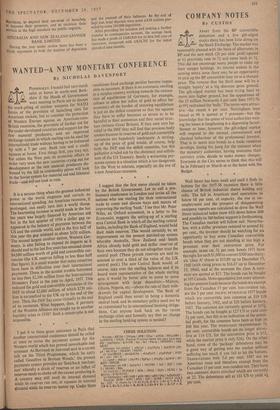COMPANY NOTES
APART from the BP convertible debenture and a few gilt-edged stocks there has been little doing on the Stock Exchange. The market was
reasonably pleased with the basis of allotments in BP and the new stock (20 per cent. paid) opened at 6f premium, rose to 71- and came back to 51. This did not encourage many people to make up their meagre holdings, As interest widens in the coming stIELL issue there may be an opportunity to pick up the BP convertible later on at a cheaper price. The rumour that the Shell issue will be a straight 'equity' at a big discount gains ground. The gilt-edged market has been trying hard to move into higher ground, but the appearance of the £5 million Newcastle 6 per cent. loan 1973-76 at 991 restrained the 'bulls.' The terms were attrac- tive—the recent 6 per cent. Nottingham loan issued at 98 is quoted at 5 premium—hut the knowledge that the queue of local authorities wait- ing for issues is lengthening is a depressing factor. Sooner or later, however, the gilt-edged market will respond to the normal, conventional and classical behaviour of the professional investor. That is to move into bonds as a trade recession develops, timing the jump for the moment when the monetary authorities, having overcome their currency crisis, decide to make money cheaper. Everyone in the City seems to think that this will be in February or March or at the latest with the Budget.
Wall Street has been weak and until it finds its bottom for the 1957-58 recession there is little chance of British industrial shares holding any rally. The fall in American steel operations to below 68 per cent. of capacity, the rise in un- employment and the prospect of disappointing company reports are calculated to drive the Wall Street industrial index (now 433) down below 400 and possibly to 360 before support is forthcoming. The Canadian market will follow suit. Neverthe- less, with a dollar premium reduced to around 8-1 per cent., the investor should be watching for an opportunity to buy some Canadian convertible bonds when they are not standing at too high a premium over their conversion price. For example, HOME OIL 54 per cent. bonds 1971 have the right for each $1,000 to convert $500 into thirty- six 'class A' shares at $13.89 up to December 15, 1960 (with rising prices to $16.67 up to December 15, 1966), and at the moment the class A com- mon are quoted at $15. The bonds can be bought at 105 Canada. More speculative, but more interest-
ing for pension funds because the bonds are exempt from the Canadian 15 per cent. non-resident tax,
are the 5 per cent. PACIFIC PETROLEUM 1977 bonds
which are convertible into common at $19 US before January, 1962, and at $20 before January,
1967. The common are currently quoted at $194-. The bonds can be bought at 125 US to yield only 31 per cent., but this is an indication of the poten- tial profit, for the common have been as high as $40 this year. The WESTCOAST TRANSMISSION 51 per cent. convertible bonds are no longer attrac- tive at 114 US, for the conversion price is $35, while the market price is only $26*. On the other hand, some of the 'package' debentures may be a good way of getting into the market without suffering too much if you fail to hit the bottom. TRANS-CANADA PIPE 5.6 per cent. 1987 arc an American issue and therefore exempt from the Canadian 15 per cent. non-resident tax. They have two common shares attached which are currently at 22. The debentures sell at 131 US to yield 41 per cent.


































 Previous page
Previous page